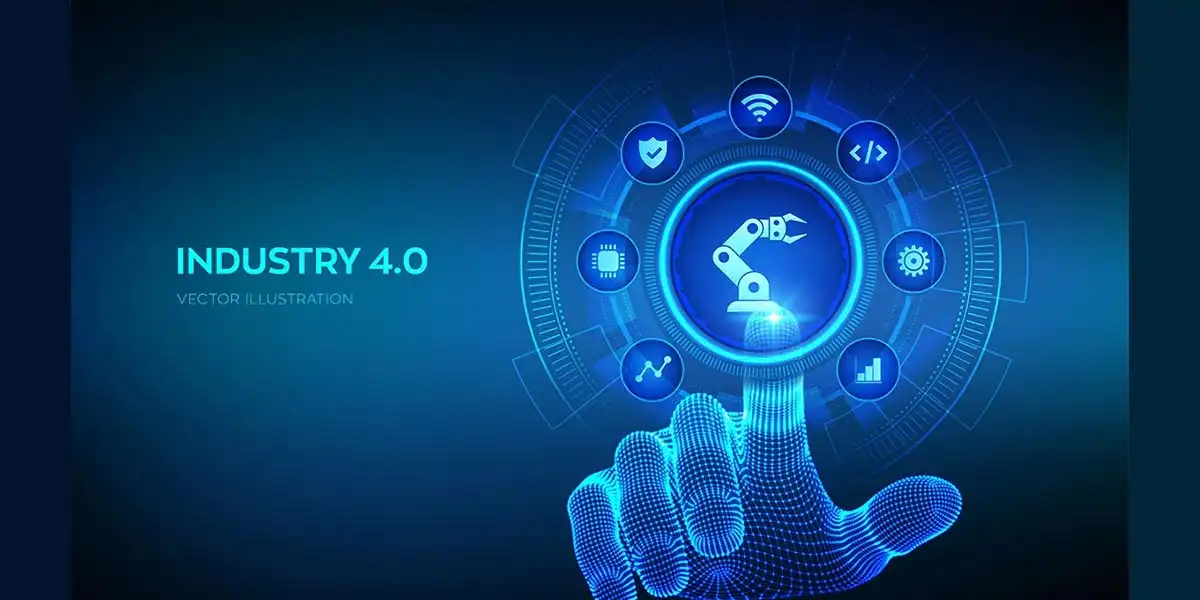
Aug 25, 2022
Blog Energy & Sustainability How Industry 4.0 is Shaking Up Manufacturing
Industry 4.0 embraces a new era of interconnected technologies. While the first industrial revolution saw the rise of steam power and mechanisation on a mass scale, the fourth industrial revolution or Industry 4.0, anticipates a mass cyber-physical overhaul.
Cyber-physical systems, the Internet of Things (IoT), cloud computing, and cognitive computing are the cornerstones of Industry 4.0. With market growth in this area already considerable, it is more a question of not if, but when it will become mainstream. In the run-up to 2023, BCC Research has predicted investments in Industry 4.0 will reach $21.7 billion. This impressive figure proceeds a period of steady growth, with compound annual growth rates at around 23.1% since 2018.
Industry 4.0 carries a multitude of implications. From being overused in marketing tactics to being portrayed as a mechanistic threat to factory workers, pinning down a definition can be tough. But at its core, it simply refers to the increasing automation of industry through information technology.
The four cornerstones of Industry 4.0 will, in theory, revolutionize manufacturing. Cyber-physical systems, the IoT, cloud computing and cognitive computing will enable flexible and efficient operational processes. Costs will be dramatically lowered. Scale and profitability will increase.
With human intervention still a necessary element to most stages in the manufacturing process, Industry 4.0 will inevitably shake up the industry. Digitalisation and robotics are not new to manufacturers, but they have yet been fully augmented with wireless technology. With the implementation of Industry 4.0, machines can function and operate in an interconnected fashion. Data can be passed along a network of computers, machines, and sensors. Automated decisions and decentralised processes to be carried out.
Just as a technological framework underpins Industry 4.0, there are also a set of concepts driving change. Industry 4.0 was conceptualized with four key principles designed to move manufacturing processes forwards.
As with most things, there are challenges ahead for Industry 4.0. Manufacturers need to address several issues before systems can be fully and seamlessly implemented.
Industry 4.0 will inevitably drive enormous changes in the world of manufacturing. These changes are symptomatic of a greater societal shift towards automation and IoT-based operating systems. Still in its early stages, the full impact of Industry 4.0 is yet to be determined, and with several obstacles for manufacturers to overcome, the path may not be smooth. Though if implemented effectively, the outcome will be nothing short of revolutionary, recalibrating the entire framework of manufacturing. Automation offers the potential to free up resources that can be directed towards more fulfilling and impactful tasks.
BCC Research’s report deep-dives into the Industry 4.0 market, dissecting recent regional trends, key players, and market opportunities. To get to grips with the full scale of this vital market landscape, consider buying the report in full here. Or, become a member of the BCC Research library and gain access to this report among a host of other relevant reports in your field. Get in touch today to find out more about the benefits of membership.

Olivia Lowden is a Junior Copywriter at BCC Research, writing content on everything from sustainability to fintech. Before beginning at BCC Research, she received a First-Class Master’s Degree in Creative Writing from the University of East Anglia.

Electrical switches—devices that control the flow of electricity—are the backbon...

As the world accelerates toward net-zero emissions, hydrogen, and ammonia have e...

Hydrogen technology is widely used across industries like glass, fertilizer, met...

We are your trusted research partner, providing actionable insights and custom consulting across life sciences, advanced materials, and technology. Allow BCC Research to nurture your smartest business decisions today, tomorrow, and beyond.
Contact UsBCC Research provides objective, unbiased measurement and assessment of market opportunities with detailed market research reports. Our experienced industry analysts assess growth opportunities, market sizing, technologies, applications, supply chains and companies with the singular goal of helping you make informed business decisions, free of noise and hype.